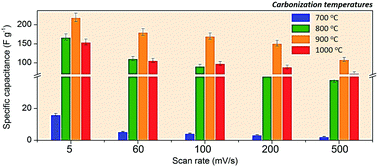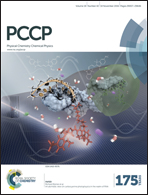Zeolitic imidazolate framework (ZIF-8) derived nanoporous carbon: the effect of carbonization temperature on the supercapacitor performance in an aqueous electrolyte†
Abstract
Nanoporous carbon materials are a versatile source of carbons that would be useful in applications ranging from electronics to electrochemical energy storage. Here, we focus on nanoporous carbon materials prepared by direct carbonization of zeolitic imidazolate frameworks (ZIF-8) towards supercapacitor applications. Several types of nanoporous carbons have been prepared by varying the applied carbonization temperature. The symmetric devices assembled using nanoporous carbon electrodes were tested for their optimal performance in the electrolyte of sulfuric acid solution. We demonstrate the effects of various factors (e.g., surface area, nitrogen content, degree of graphitization, and relative percentage of micropores) on the performance.


 Please wait while we load your content...
Please wait while we load your content...